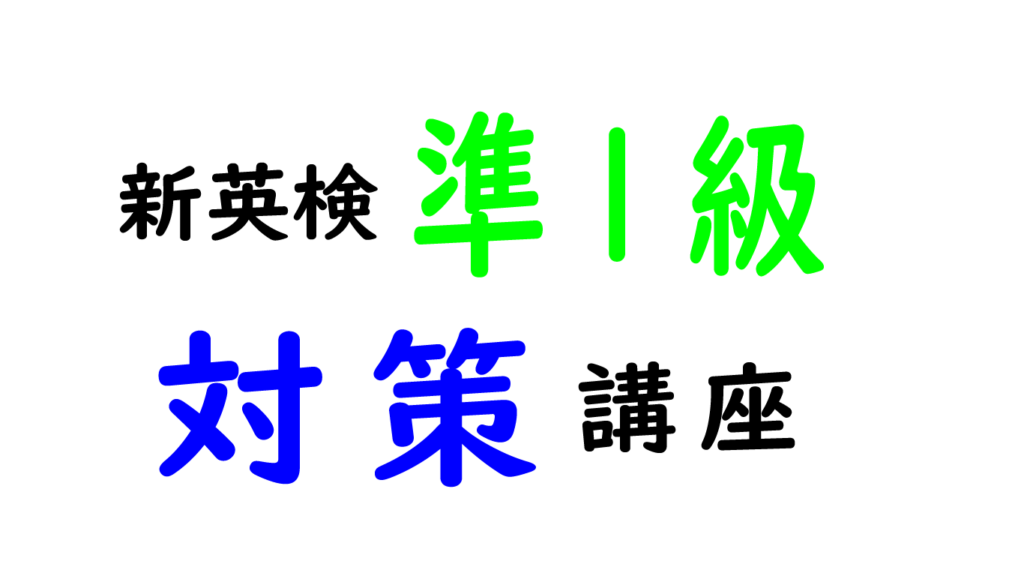
2024年より実施される英検の問題が一部大きく変更がされ始めました。今回は準1級の変更点、及びその対策を講じていきます。また最後には類題も用意してあるので、対策演習用に使ってみてください。
変更点の概要
時間:変更なし(90分)、リーディング:41問→31問(大問1から7問、大問3から3問削除)、ライティング:1題→2題(英作文に文章の要約記述)、Speaking(二次面接)のNo.4に導入文が追加
Speakingの変更点も気になるかもしれませんが、例としてはこれまでは、"Should rich countries do more to help poor countries develop?"となっていただけのところを、"The wealth gap between rich countries and poor countries often becomes a topic for discussion. Should rich countries do more to help poor countries develop?"のように前提文が付くだけなので、あまり問題視しなくてもいいでしょう。準1級もやはり、ライティングにのみ気を付ければいいので、以下ではライティングのみ変更点の解説をしていきます。尚、要約ライティング解答の大まかな解答目安配分は20分程度です。
問題例
● Instructions: Read the article below and summarize it in your own words as far as possible in English.
● Suggested length: 60-70 words
● Write your summary in the space provided on your answer sheet. Any writing outside the space will not be graded.
From the 1980s to the early 2000s, many national museums in Britain were charging their visitors entrance fees. The newly elected government, however, was supportive of the arts. It introduced a landmark policy to provide financial aid to museums so that they would drop their entrance fees. As a result, entrance to many national museums, including the Natural History Museum, became free of charge.
Supporters of the policy said that as it would widen access to national museums, it would have significant benefits. People, regardless of their education or income, would have the opportunity to experience the large collections of artworks in museums and learn about the country's cultural history.
Although surveys indicated that visitors to national museums that became free increased by an average of 70 percent after the policy's introduction, critics claimed the policy was not completely successful. This increase, they say, mostly consisted of the same people visiting museums many times. Additionally, some independent museums with entrance fees said the policy negatively affected them. Their visitor numbers decreased because people were visiting national museums to avoid paying fees, causing the independent museums to struggle financially.
(解答例)
The British government implemented a policy that would help national museums to provide fee admission to the public. Supporters believed this would encourage people from various backgrounds to visit museums. However, while visitors increased, some critics of the policy pointed out the increase was largely due to repeated visits from the same people. Moreover, some independent museums with admission fees stated the policy led to a drop in their revenues.
これは英検協会から発表されている例です。この解答についてまず1番大事になるポイントとして、1文目が1段落の、2文目が2段落の、そして3,4文目が3段落の内容の要約であることに注文します。書き出す前に気を付けることとして、①3段落あるので、目安として1文辺り10語~20語程度の文を作るような心づもりでそれぞれの段落をまとめ、②条件にある通り、そのまま文にある表現や単語を使うのを避ける、といったところに気をつけましょう。
各段落を書き出すにあたってまず要約するとはどういうことを言うのかですが、大まかに以下のステップがあります。
①<単語や表現を言い換える>例:"from the 1980s to the early 2000s→in the past"、"Britain→British"など
②<構文を変える>例:"The newly elected government, however, was supportive of the arts→but the arts are supported by the newly elected government"(受動態に変えたり品詞等を変えて言い換える)
③<具体的なものを抽象語でまとめる>例:(2段落をまとめて)It is educationally good.
上記のように①~③の技術をそれぞれの段落で使うことが求められます。
それでは各段落。各文を見ていきましょう。
最初の青い線の引かれている部分は第一段落とその要約です。1段落は前提文になるので、この話の背景を書くことになりますが、結論内容(As a result,以下)をしっかりと書くことが大事になります。この場合第1段落で重要なこととしては、「現政府の方向転換により」、「国立博物館(美術館)が無料になった」というところです。例としては、The British government launched a new policy to support national musuems by providing financial aid so that visitors can enter the museums for free.(24語)
次に黄色い線部ですが、ここでは利点が書かれています。誰がどのような利点を言っているのかを明確に書くことが大事になります。この場合、「その政策支持者は言った」"supporters said"という点と、「人々はそのバックグランドに関係なく体験したり学べたりできる」"people, regardless of their education or income, would have the opportunity to experience~ and learn"の2点を抑えたいところです。例えば,"The supporters insist that any visitors from several backgrounds can appreciate the experience in the museums fairly."(17語)のように書くといいでしょう。
最後に赤い線部分(3,4文目)についてです。基本的には2段落と対比の意見が出てくることでしょうから、"on the other hand"や"however"などの使い方を身に付けておくとスムーズにいけます。今回の文では、「訪問者の増加」"visitors to national museums that became free increased by an average of 70 percent"「同じ人が何度も来る」"same people visiting"という点と「独立採算をとっている博物館が経済的に苦しんでいる」"causing the independent museums to struggle financially"という点が趣旨になるので、その2点は外せませんね。例えば、"However, the cause of the increase of the visitors is the number of the same people visiting there many times."(20語)、"Some independent museums face financial problems."(6語)などと入れて組みなおしていくと、
The British government launched a new policy to support national museums by providing financial aid so that visitors can enter the museums for free. The supporters insist that any visitors from several backgrounds can appreciate the museums fairly. However, the cause of the increase of the visitors is the number of the same people visiting there many times, in fact. Furthermore, some independent museums face financial problems.(67語)
以上のように、60-70語というのは一見長そうに見えますが、実際は無駄なことがほとんど書けません。きちんと分量配分をすることで、余すことなくピンポイントでその内容が書けるようにしましょう。また解答目安時間は20分程度になります。リバイズする時間なども考え、15分程度で答えられるよう練習をしておきましょう。
以下は新英検準1級の要約問題の類題です。問題演習をしたい人は参考にしてみてください。
● Instructions: Read the article below and summarize it in your own words as far as possible in English.
● Suggested length: 60-70 words
● Write your summary in the space provided on your answer sheet. Any writing outside the space will not be graded.
The first university for the elderly was built in China in 1983. It was based on similar schools in Europe. Thousands of such universities have opened since then, offering traditional academic courses alongside skills-based courses. They are open to students over the age of 60 and, as China has the world's fastest aging population, they have proven to be extremely popular.
Through the classes, the students can have benefits including learning new skills and memory improvement, both of which can help to slow the decline of the brain. The universities also give students a chance to meet people and be part of a community, thereby lowering the risk of loneliness.
Meanwhile, not everybody who wants to attend the universities can do so. With such a high number of applicants who wish to be admitted, there is now the need for admission lotteries and entrance competitions. In addition, the funding of the universities would require further amounts of money, putting pressure on the welfare system.


